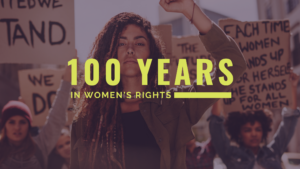
What has happened in the last 100 years in Women’s Rights?
Alice Pott was my maternal Grandmother and has been the inspiration behind so many of my choices in my life.
She consistently put art supplies in my hands, taught me to bake and led me on wild adventures in the same creeks she played in as a child.
Alice was the rock in my childhood that I needed whenever my biological father would cause chaos – whether refusing to let the police enter her home when I hid from him at 3 year old. Alice stood her ground against him fighting to have grandparents rights when he won custody of me. She was the second person I called when he disowned me, my mom was the first but she was sleeping having worked night shift. Alice got in her car, driving out to the far to bang on my mom’s window, telling her “Maggie’s coming home.”
Alice Pott born March 27th 1925 in Rockport, IL. She would be 100 years old today and to honor her legacy I want to share a brief review of all the changes in women’s rights that have happened since she was born.
- 1960 – FDA approves the first ever birth control pill for women.
- 1963 – Equal Pay Act, prohibiting sex-based wage discrimination between men and women performing the same job in the same workplace.
- 1964 – The Civil Rights Act is signed into law; Title VII bans employment discrimination based on race, religion, national origin or sex.
- 1965 – The Voting Rights Act of 1965.
- 1968 – Executive Order 11246 prohibited sex discrimination by government contractors.
- 1969 – The Seventh Circuit Court of Appeals ruled that women could work in many jobs that had been for men only.
- 1972 – Title IX of the Education Amendments prohibits sex discrimination in education programs that receive federal funding.
- 1972 – Single can be prescribed birth control.
- 1973 – The Supreme Court ruled in Roe v. Wade that the Constitution protects a woman’s right to an abortion.
- 1974 – Equal Credit Opportunity Act (ECOA) signed into law to make it illegal for banks to discriminate in lending based on sex or marital status. Meaning women could finally have their own mortgage, bank account and credit cards.
- 1990 – The Americans with Disabilities Act of 1990 protected access to the ballot.
- 1993 – The Family and Medical Leave Act of 1993 provided unpaid leave for families
- 1994 – The Violence Against Women Act as part of the Violent Crime Control and Law Enforcement Act is signed providing funding for programs that help victims of domestic violence, rape, sexual assault, stalking and other gender-related violence.
- 2010 – The Equality Act protected pregnant and maternity leave as a protected characteristic
- 2013 – The Supreme Court weakened the Voting Rights Act, allowing states to pass laws that restricted voting for women and other groups.
- 2013 – The U.S. military removes a ban against women serving in direct ground combat positions.
- 2022 – The Supreme Court overturned Roe v. Wade.
- 2024 – DEI banned.
Look around Sesh and you’ll find many hidden inspirations from Alice – our prior mural had a pinkie promise with tattoos on the wrist similar to the tattoos that my mom, sister and I have, mine being Alice’s signature.
There’s a random letter A sitting in our library because A is for Alice.
You can find her in the Hall of Hou.
Alice passed in 2013, a few months after my daughter was born, however I did manage to get a couple visits to Illinois to make sure Alice met and held her great-granddaughter. Funny enough, the last time they saw each other, Alice said “I think it’s just wonderful that you named her Alice Junior”.
My daughter’s name is Ele, and I certainly didn’t correct Alice because I wanted to her know that even in passing, Alice would always stay right here with me forever.
I share Alice with you during this Women’s History Month because, not only would it be her 100th birthday, but I want to remind everyone of how little time has passed since women were granted the right to have our own bank accounts, credit cards and birth control.
Alice fought for me as her next generation which changed the trajectory of my life immensley. A lesson I don’t take lightly, because it shows that we need to fight for our next generation of Alice Juniors. Their ability to thrive is at stake.
If you aren’t sure how to get involved or what to do – write letters or call your local legislators. State Reps count each and every letter/call using that as data to fight on our behalf. Even if you don’t think they’ll listen because they’re on “the other side” know that at some point enough of us saying the same message over and over again will sink in. Our voices, as history shows us, can create cracks in the foundation of their best efforts, and that is how democracy thrives.
You can join us at Sesh April 3rd from 1pm -2pm to write letters co-hosted by our friends at the League of Women Voters Houston.
We, the people, have a voice and let us use it!
Source: https://www.history.com/topics/womens-history/womens-history-us-timeline; https://www.history.com/this-day-in-history/fda-approves-the-pill;

